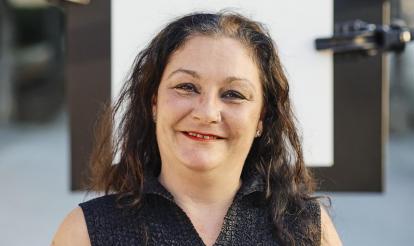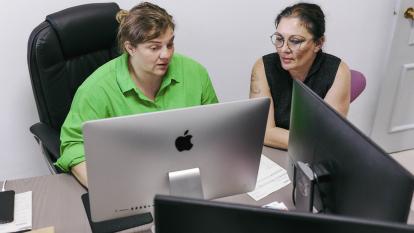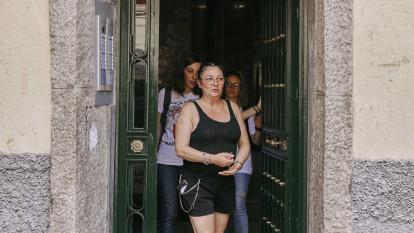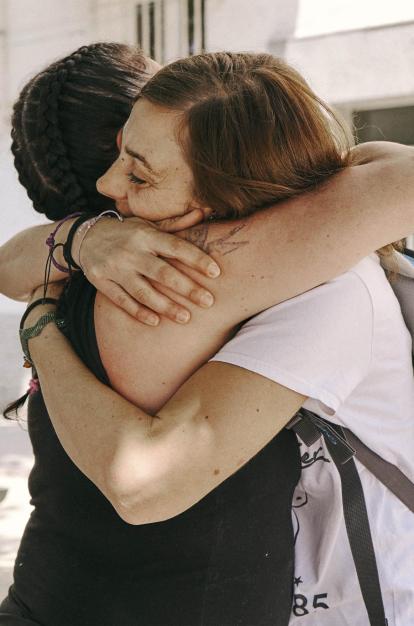
You are reading:

You are reading:

A victim of gender-based violence, when she was 30 years old Ana found herself living in a shack in a park. She managed to get by, but a new partner also abused her; she had to leave her daughter with social services and ended up homeless once more. Thanks to La Morada Housing First, a programme run by the AIRES association in collaboration with the ”la Caixa” Foundation, she managed to have a roof over her head again, regained custody of her daughter and began training in her passion: make-up.
When they enter Ana’s house, the two AIRES Foundation workers greet her like old friends. “How beautiful! And those braids?” “A classmate did them for me.” “Oh, you’ll have to show me sometime.” “Of course! As soon as the course is over, I’ll do whatever you want.” After exchanging jokes and greetings, they talk about the “Action Plan”, the document they draw up every six months in which they set goals for her health, work and social and affective life. But above all, they are concerned about her emotional well-being. And Ana tells them that she is very happy with her characterisation and make-up classes for film and television, and that apart from the usual teenage things, her daughter makes her very happy. “She’s failed two, but she can pass the course. She says she doesn’t understand equations, that she doesn’t understand mixing letters and numbers.” They laugh.



Today Ana laughs a lot, but her life has not been easy. When she arrived at La Morada Housing First, she had to stay in a SAMUR SOCIAL emergency room, and despite not having a home worthy of the name, she got a job and kept it – no mean feat in those circumstances. When they speak of the strength needed to accomplish such an achievement, the workers at La Morada are not surprised: as they got to know her terrible story, their admiration for this woman grew. Despite living through the most adverse circumstances, she has found a way to bounce back: even in the most difficult moments she was able to always stay in touch with her daughter, for whom she never stopped being a role model and an example of resilience and courage.
Her life on the street began at the age of 30. To the traumatic experiences of her past – her first husband abused her and she had to leave her son with her parents – she added what she calls “the ordeal of the street”. She survived in a small shack in a park in Madrid, navigating the many dangers that lurk on the streets, especially for women: robberies, assaults, rapes… Years later, she managed to get off the street and start a new life with the father of her daughter, but what seemed like a positive turn ended up becoming a nightmare. Ana once again experienced abuse in her home and, forced to leave her daughter with social services, she returned to the streets, this time enduring a tortuous legal process as a victim of gender violence. And yet she has not let herself be defeated; rather, she has overcome all adversity.


It was at that time that she found support from the AIRES Association, an organisation that works for social inclusion – residential, relational and economic – and that makes housing a priority element of the process. Hence, one of its flagship projects is La Morada Housing First, a programme which, thanks to the ”la Caixa” Foundation, provides access to housing for homeless women who have survived various forms of violence, as a first step towards their integration into the community, through support and recognition of the importance of work to maintain a life project. “Through the association, I got a flat to live in,” says Ana. And the AIRES workers add that she’s achieved much more: “She managed to rebuild her life and build herself anew.” Once she was settled into her new home, she started working to get her life back on track. She couldn’t imagine a life without her daughter’s company and managed to win custody of her. But she didn’t stop there: she got back on her feet and gave herself the chance to start again. According to her, “the trust, support and love of ‘the girls’” have been essential for her to believe in herself.
The AIRES psychologists point out the almost heroic transformation that Ana has undergone. “In addition, she’s now studying what she’s always been passionate about and has a talent for: make-up and characterisation. Ana is an example of survival and resilience like few others. And most importantly, the best of her life is yet to come.”
Ana’s story is part of the documentary project Life stories, 14 stories of overcoming adversity which gives a voice to people at risk of exclusion who share their experiences in order to raise public awareness.